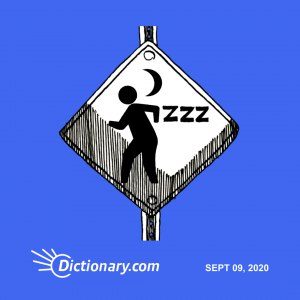Word of the Day
somnambulism
noun
sleepwalking.
More about somnambulism
Somnambulism, “sleepwalking,” comes via French somnambulisme from New Latin somnambulismus, a pretty transparent compound of the noun somnus “sleep” and the verb ambulāre “to walk, take a walk, stroll,” source of English amble. Somnus is the Latin result of the very common Proto-Indo-European root swep-, swop-, sup– “to sleep.” In Latin, the derivative noun swepnos (or swopnos) becomes sopnos, then somnus. The derivative noun supnos becomes hýpnos in Greek. Another derivative noun, swep–os-, becomes sopor– “sleep” in Latin (via swop–os-, then sopor-), as in English soporific “causing sleep.” Swepnos becomes swefn “sleep, dream” in Old English and sweven “dream, dream-vision” in Middle English. William Langland, usually considered to be the author of Piers Plowman, fell into a merveilouse swevene, a “curious dream,” one May morning in the Malvern Hills in Hereford and Worcestershire, England, and Piers Plowman is the narrative of his dream. Somnambulism entered English at the end of the 18th century.

how is somnambulism used?
Sleepwalking, or somnambulism, doesn’t always involve walking. A person is said to be sleepwalking if they are performing a complex task—talking, sitting up in bed, getting dressed—while in a state of deep sleep, according to the National Sleep Foundation.
Out and about, I spotted drowsy or dozing people everywhere; and I realized that a kind of mechanized mass somnambulism is an essential component of modern life ….
somnambulism


doddle
noun
something easily done, fixed, etc.: He was really worried about my finishing the fence repairs on my own, but it was a doddle.
More about doddle
Doddle, “something easy to do or fix,” is a British colloquialism of uncertain origin. Some say it comes from Scottish doddle “a small lump of toffee” (and therefore attractive and easy to make away with). Some say doddle may come from the verb dawdle “to waste time, idle.” Doddle may also be a variant of the verb toddle “to move with short unsteady steps” (as a toddler does). Doddle entered English in the first half of the 20th century.
how is doddle used?
But it is a delusion to think we can solve Earth’s problems by relocating to Mars. I completely disagree with Musk and with my late colleague Stephen Hawking on that, because dealing with climate change on Earth is a doddle compared with terraforming Mars.
This [journey] would have been a doddle on Highway 1 at any other time of year, but a succession of winter storms had blocked the coast road with landslides in half a dozen places.
doddle


Promethean
adjective
creative; boldly original.
More about Promethean
Promethean is the adjective derived from Prometheus, one of the Titans, the race of divine beings that preceded the Olympian gods (there was bad ichor between the two races). The Greek poet Hesiod interpreted Prometheus as “Forethought”; Prometheus’ twin brother Epimetheus was therefore “Afterthought.” Prometheus and Epimetheus (and Atlas, too) were sons of Iapetus, whose Hebrew equivalent, Japheth, is a son of Noah (Genesis 5:32). Promethean entered English towards the end of the 16th century.
how is Promethean used?
While this work suggests man’s helplessness in the face of nature’s relentless power, Cai’s exhibit suggests an ironic thematic reversal: nature’s state of helplessness in the face of modern man’s relentless, Promethean drive to progress.
That ambivalence is the divided heart of the novel: Gatsby is a dreamer and a “go-for-broke Promethean overreacher,” but—as Corrigan’s former high school teacher tells her, “Gatsby was looking for the wrong things. . . . Money and clothes and Daisy.” He embodies the best and worst qualities of America, resulting in a novel that is simultaneously buoyant and grim, as Corrigan notes.
Promethean





